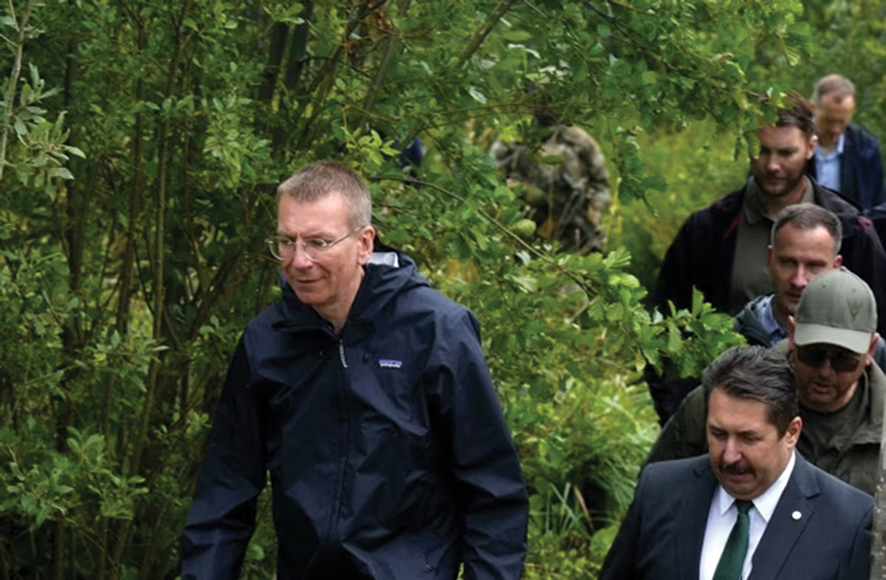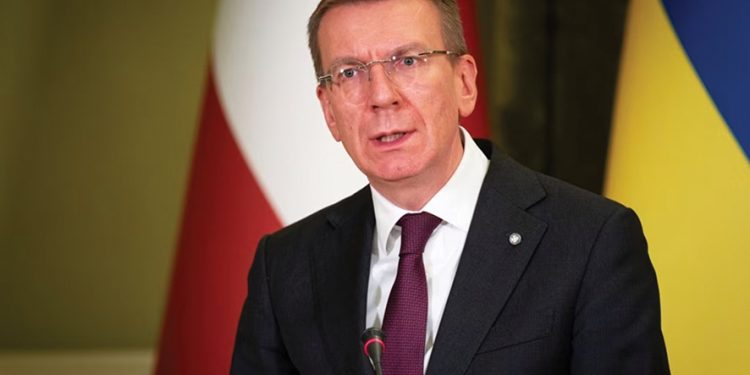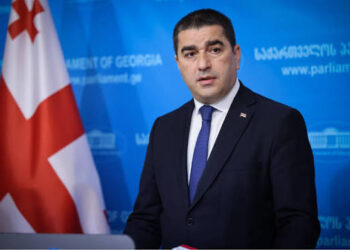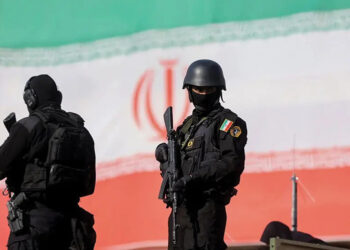In July 2023, Edgars Rinkevics assumed the presidency of Latvia, concluding an 11-year tenure as the longest-serving foreign minister in the history of his Baltic nation.
Since 2014, Rinkevics has been an outspoken critic of Russia’s aggressive actions towards neighboring Ukraine. He drew parallels between the annexation of Crimea and the Soviet occupation of the Baltic states in 1940, famously stating, “History repeats itself, first as tragedy, second as farce.”
During the recent Munich Security Conference, RFE/RL’s Georgian Service caught up with Rinkevics to discuss the potential role of Ukraine in fostering a more democratic future for Russia, and the role Europe plays in working toward that goal. We started our interview, however, with the event that overshadowed pretty much everything at the conference – Alexei Navalny’s death.
How big a blow is Navalny’s death for the hopes of having a better Russia? A Russia that wants to try its hand at democracy again?
The very fact that all the opponents of Mr. Putin are either in jail, or are somewhere in exile, and that Mr. Navalny was not the first opponent to die, actually testify to that. At this point, it is very difficult to imagine any kind of opposing force that could make difference in Russia, though it may happen sometime in the future. Things are not frozen in time. They are not constant. They keep moving. But I think this has been a very symbolic end of an era.
We remember how Navalny turned, fought corruption, exposed officials. You could agree or disagree with him as a politician, but, technically, he was a very viable alternative to the current regime. And that’s why he was imprisoned and died.
I also believe that we must understand that our condemnation of his death, the Western world saying how bad it is, means nothing to the Kremlin at this point. Mr. Putin has his own goals. He wants, first of all, to eliminate any dissent back home. And, of course, he wants to advance his foreign policy, and achieve his imperialistic goals.
What do you expect the Western reaction to Navalny’s death to be, beyond the usual consternation and condemnation?
The only viable way to respond to this tragic news is to provide more assistance, more weapons, to Ukraine. To some extent, the possibility of a better Russia, a more democratic Russia, currently lies not in Russia itself, but in Ukraine – on Ukraine being able to defeat this regime, to emerge victorious.
I do believe that we still have this very wrong narrative that we are going to support Ukraine “as long as it takes” – we should change it to “we are going to support Ukraine until their victory,” even with all the issues that we now face: funding, a bit of fatigue. It’s a major, important message that leaders of the free world should send, that “we will support your claim until your victory.”
And I would say the victory of Ukraine means also some possible changes in Russia, not necessarily positive ones [for Russia], but at least there is a chance for change.
I would say that the only viable way to react is not to impose sanctions on that or the other judge, prosecutor, or the warden of the prison where Mr. Navalny died, but to actually double down on support to Ukraine.
We have talking a bit about the lesson learned from 2008, from Russia’s aggression against Georgia. Now, everyone is saying that if we had been smart enough then, the war in Europe would never have kicked off. But this is no longer the case. I think that now, and I repeat this whenever I meet the press or colleagues if they don’t realize, not providing enough help to Ukraine will mean a kind of cease-fire or the end of hostilities probably only for the time being. Russia has shown that over the last 16+ years, it’s been on a war footing, and it will continue to be so. So from that point of view, I would say Mr. Navalny’s death has reinforced the message that we have to continue fighting Russia any way we can. And we know that Ukraine is fighting not only for us, but, to some extent, fighting instead of us.

When you visited Kyiv, you pledged to President Zelensky that Latvia would stand with Ukraine until its victory. What does this victory look like for Ukraine and, in a broader sense, the West?
I think this is a question that is very easily answerable, but is not so easily deliverable. The Ukrainian president has presented his peace formula, and what this peace formula says is that Ukraine must regain control of its own internationally recognized borders, but this is something that will be very difficult to deliver. And yes, this year is going to be difficult, difficult in that we are not delivering enough. We are ramping up the defense industry, we are going to see to it that Ukraine receives more sophisticated weapons, but I think that the only way Russia can start to talk about the end of hostilities and agreeing to the peace formula is if they understand that they can’t advance anymore, that they are losing ground, and that their own internal stability, their regime, is threatened. And that is where if I am asked the timeline, I wouldn’t be able to give it and a lot depends on the Ukrainians.
Is there willingness in the West to do what needs to be done?
All my colleagues with whom I was speaking understand that, at this point, this is a very complex issue. There is the example of 2008 in Georgia, there is the example of 2014 in Crimea and Donbas. And there is the example of subversive actions when it came to the Latvian election process back in 2016, 2017. We also see attempts to intimidate in countries like Moldova. But there is this difficulty that we, as leaders, are trying to find the right way to talk with our public. Why? Because there is a bit of fatigue. If they switch on the TV, or look at news sites, and see the Ukraine war, some people continue watching, some simply move on to something else. And we have this very complex situation in the Middle East, which has also taken a toll on the global community.
More defense spending, the establishment of conscription or building the Baltic defense line, we have plenty of work to do
And then, of course, you understand that if there is a stalemate, then Russia can regroup. And then you have to honestly tell your public that you have to be prepared for all kinds of scenarios. I’m not saying that we should approach the current situation with a sense of gloom and doom, but we have to be prepared for all kinds of scenarios, back home as well. It requires some effort to mobilize the civil protection system; it has to be reconfigured according to the experience of Ukraine: More defense spending, the establishment of conscription, or building the Baltic defense line. We have plenty of work to do.
Some Scandinavian countries have told their people it’s not an unrealistic possibility that Russia will launch an attack against them in three to five years. What would the reaction be to that idea in Latvia?
For us, those “realizations” we hear from other capitals in the West are nothing new. We knew that Russia was getting more and more belligerent; we saw what was happening in Georgia, in Ukraine; we saw what was happening in our neighboring Belarus in 2021. With the assistance of President Putin, Mr. Lukashenko suppressed unrest. This is not anything that I would say is new. But having said that, I see a need to somehow tell the public that, first of all, we need to spend more on security, including both defense and internal security. We have to work with our allies.
For the Latvians, then, the narrative would be a bit different than for those countries that even a couple of years ago said it’s unimaginable. Now, everything is possible. And we should understand that when we are past this phase, once we have acknowledged the problem, then we need address it, find a solution, and the solution is more defense industry, more defense spending.
Are Russia’s known tactics of passportization and using Russian speaking residents in other countries for aggression something you fear might happen in Latvia, with its rather sizeable Russian-speaking minority?
We do take the internal security challenges seriously, and that’s why legislation has been passed to this effect and there is now a more rigorous vetting process. And at the same time, I would say that we were aware of some of those tactics long in advance. We saw heavy attempts to issue Russian passports 10 years ago, when we were introducing our social security system reform, raising the pension age, when all of a sudden those people who had taken Russian passports instead of Latvian understood that, actually, life is not as nice as it seems.
To some extent, the possibility of a better Russia, a more democratic Russia, currently lies not in Russia itself, but in Ukraine
We have been talking with those who live in Latvia and don’t speak Latin as a native language. If you look at the opinion polls, they present a very interesting picture: About a quarter of those non-Latvian speaking citizens support Ukraine, a quarter support Mr. Putin, and the rest either refuse to give an exact answer or say they are “confused.” It would be very wise to try to understand how confused they are, and why they are not answering the question.
How do you see coexistence with Russia in general, in the future? Do you ever see yourself visiting Russia?
It’s impossible to imagine that during my mandate, I will go to Russia or receive any Russian official. I don’t think it’s going to happen. And I don’t believe that, even in the best possible scenario, we are going to see Russia changing in a radical way for democracy, human rights and rule of law.
The whole history of Russia shows that there are waves where they turn to the West, want to be like the West, but they never quite get there. Now we are in the wave where Russia is completely turning away from being a part of Western civilization, but that wave is also going to pass. My concern at this point would be that if Russia feels that it has won, it will try its luck. And if Russia feels that it has lost, but the current regime continues in power, then there will be a kind of humiliation and they will probably attempt to somehow correct the mistake. So like it or not, we will have to face, for the next few years, I don’t know, maybe decades, living next to a very unpredictable, dangerous country, maybe a time that resembles a little bit those years of the Cold War.
I want to ask about the enduring reluctance of the Old West to see Russia as the Baltic countries, or more broadly, Eastern Europe, see it. All despite history proving you right on a continuous basis.
To some extent, I think that last two years have shown that we are getting closer, but we have not met each other yet. I think we are getting closer because there is an understanding that in the 21st century, Russia can use very brutal means to launch a war; Russia can kill innocent civilians.
But there are two elements that I try to understand when I’m talking with my Western counterparts: First is that we have a bit of a different history, one that saw most of Western Europe freeing itself of Nazi occupation, or getting liberated from Germany, which had become one of the leading global anti-European powers, but which saw us getting another 50 years of Soviet occupation that ended relatively recently, only 33 years ago. And that’s why we have those kinds of memories.
Second, I think that everyone was so excited that the Cold War was over, there was this very wishful thinking that is very difficult to get rid of it.
And let’s not forget that there are many other pressing issues for many of the bigger and smaller European countries. Russia, as part of the UN Security Council, has global reach. And to some extent, there is this feeling that if you properly addressed them, you could probably get some kind of deal. I don’t believe that: I see that deals are honored by Russia only if they believe they serve Russia’s interests. As soon as this stops, they break them. Be it Ukraine, be it Georgia, be it any other international treaty they have signed in the last 30 years.
Interview by Vazha Tavberidze at the Munich Security conference














